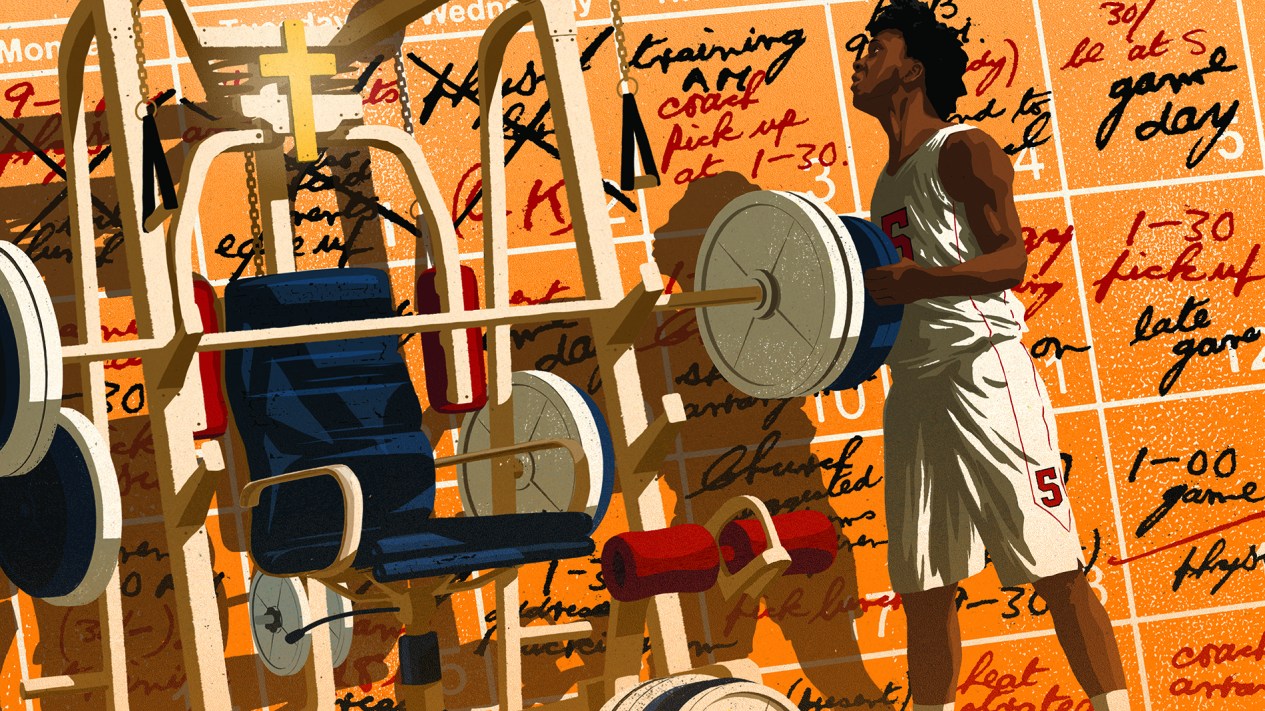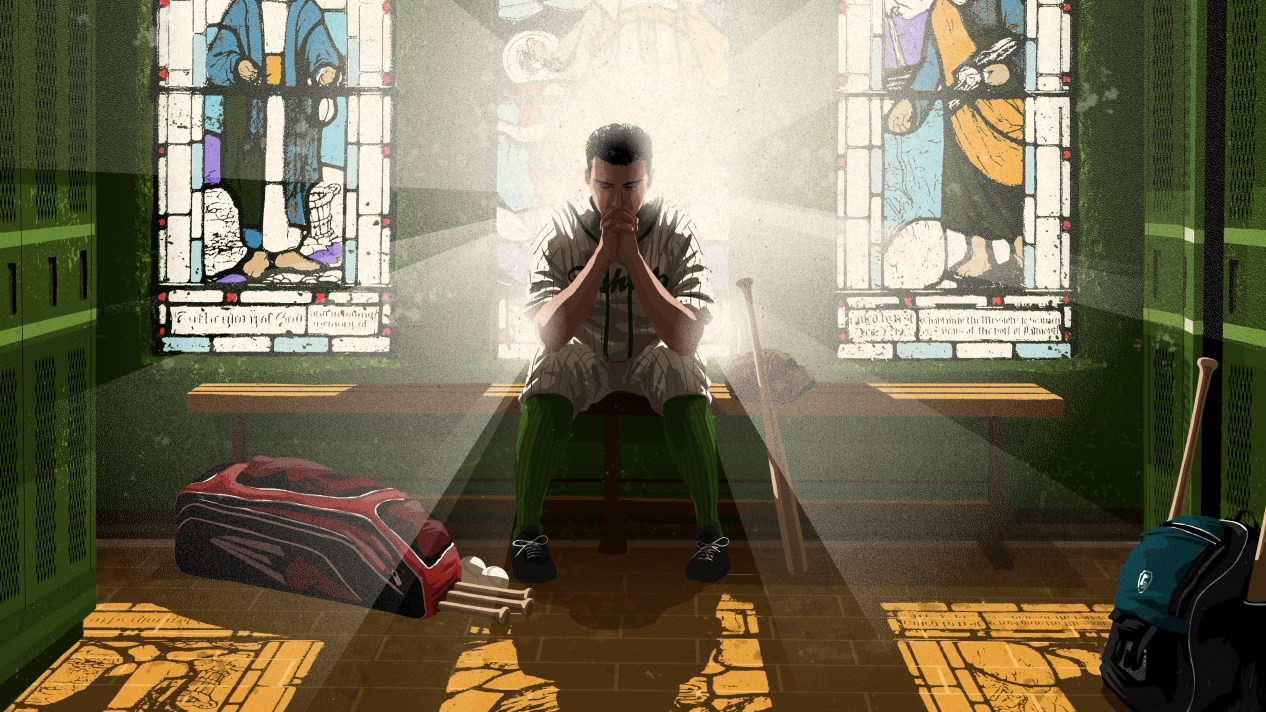Ready to transform your school’s athletic program? Learn more about the Faith & Sports Institute’s certificates, degree programs, and resources by taking a short survey to find your perfect fit.
The wind whips across the football field as two teams huddle around their coaches during a crucial timeout. On one sideline, a coach’s fury carries across ten rows of spectators as he berates his team, heavily favored in the game, for dropped passes and failed routes. His players shift restlessly, their frustration building with every word.
Across the field, an entirely different scene unfolds. Despite their underdog status and season of losses, these players lean in close as their coach’s voice rises with pride, not anger. “Great tackle out there,” he calls to one player. “Way to lift up your teammates,” he tells another. His words of praise for leadership and speed draw his team closer, their faces bright with determination.
These young athletes are learning more than game strategy. Through their coaches’ words and actions, they are receiving messages about what matters in life, who they are becoming, and what it means to strive for excellence. The contrast between these approaches cuts to the heart of a question facing Christian athletics today: Can sports be more than just a venue for competition? Could they become a sacred space where faith and physical discipline merge?
A quiet revolution is taking place on playing fields across the country, where Christian coaches and athletic directors are reimagining what it means to develop better athletes and whole persons made in the image of Christ. Their goal is not just to win games, but to transform every sprint, tackle, and team huddle into an opportunity for spiritual formation.
What Victory Really Means
“We are seeing a fundamental shift in how Christian schools and educational leaders think about athletics,” says Paul Putz, who directs Truett Seminary’s Faith & Sports Institute. As he works with programs across the country, Putz notices athletic directors wrestling with how to create programs that shape not just how students play but who they become.
This integration of faith and athletics reflects a deeply biblical understanding of formation. Just as biblical athletic metaphors are used to describe the Christian life—running the race, fighting the good fight, training in righteousness—these schools recognize that physical discipline and spiritual growth are not separate domains but are intertwined aspects of what it means to be formed in Christ’s image. The body itself becomes a site of worship, echoing the Apostle Paul’s call to “present your bodies as a living sacrifice, holy and acceptable to God.”
But what does this look like when cleats hit turf? Sean Strehlow, who interviewed 45 coaches at small Christian colleges, found programs transforming traditional practices into opportunities for spiritual formation. Some coaches pause intense training sessions for contemplative prayer, helping athletes sense God’s presence in moments of physical strain. Others have reimagined team meetings as spaces for sharing testimonies and building authentic community.
Just as medieval monastics saw their manual labor as a spiritual calling, these coaches are helping athletes recognize that their physical training, with all its discipline, pain, and triumph, can be a form of devotion.
The impact shows up in unexpected moments, like a recent girls’ basketball game at Valor Christian High School in Highlands Ranch, Colorado. The intensity in the gym was electric as players’ hearts pounded and bodies moved in concert. When the buzzer sounded for a timeout, coach Jessika Caldwell gathered her team.
After praising their persistence and determination, Caldwell felt God nudge her toward something unexpected. Instead of drilling strategy, she invited her players into a spiritual practice they had cultivated all season: expressing gratitude.
“I’m so thankful,” Caldwell said. “Stay in that place of gratitude.” One by one, her players shared what they were thankful for, until one summed up the team’s spirit perfectly: “I’m thankful for how God shows up for us.”
This was not just a spontaneous moment of spirituality. Caldwell, who completed FSI’s online certificate program and participated in its immersive retreat, had woven gratitude practices into every practice session. By building spiritual habits alongside physical ones, she prepared her team to remember God’s presence even in the heat of competition.
This practice reflects a deeper theological truth: athletic talent, like all human abilities, is a gift from God meant to be received with thanksgiving and offered back in praise. It transforms what could be merely a pursuit of victory into an opportunity for doxology.
Looking to the Future
These success stories mark just the beginning of a larger transformation. Through a new partnership between the Faith and Sports Institute and Baylor Athletics, supported by the Educating Character Initiative, researchers and practitioners are exploring how to deepen character formation in college sports. They are asking crucial questions about what success really means and how to prepare athletes for life beyond their playing days.
The partnership recognizes that athletic formation is not just about creating better players or even better people—it is about participating in God’s ongoing work of sanctification. When viewed through this lens, every practice, every game, every moment of physical exertion becomes an opportunity for what the Reformed tradition calls “cultural renewal”—redeeming human activity for God’s glory. Such renewal happens most powerfully in community.
Indeed, the most transformative examples of integration emerge from loving, intentional communities that view sport as an opportunity for wholehearted worship. Coaches like Caldwell are showing how athletic programs can shape not just how students play, but how they live, preparing them to see and worship God through the most mundane and meaningful moments of their lives, from the personal to the professional.
Adam Puckett, director of athletics at George Fox University, recently completed an online Master of Arts in Theology and Sports Studies from Truett Seminary’s FSI with this aim in mind. The program, he said, connected him with a broader network of Christian leaders asking similar questions. It enabled him to “think critically and creatively about how we approach faith formation within the context of collegiate athletics.”
Throughout Christian educational institutions, from elementary schools to universities, leaders are recognizing that athletics offer unique opportunities for lasting spiritual formation. When coaches integrate faith authentically rather than merely tacking on pregame prayers, they create spaces where young athletes learn to see every aspect of life as an opportunity to know and worship God more fully. The muscle memory developed through years of combining physical and spiritual discipline becomes a framework for lifelong faith.
The Faith and Sports Institute at Baylor’s Truett Seminary is empowering the next generation of Christian sports leaders to carry this vision forward. Through research, practical instruction, and ongoing support, FSI is helping coaches transform athletic programs into spaces where excellence and worship go hand in hand—where young athletes learn not just how to win games, but how to live lives infused with purpose, community, and the joy of the Lord.
Athletic directors, coaches, and other Christian leaders interested in bringing this integrated approach to their programs should consider joining FSI’s 4th Global Congress on Sport and Christianity or their FIT Sports Leadership Summit this summer.
Unsure which program may be right for you? Take a short survey to learn more about FSI’s offerings.
Posted


